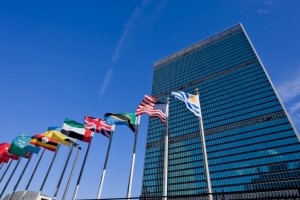The problem with the Israeli-Palestinian negotiations is that the world has conceded to the Palestinians the exact result they desire, rather than requiring the result to emerge from bilateral negotiations with the Israelis. Whether there is to exist a two-state solution – and what the borders and qualities of that sovereign and independent state ought to be – should be precisely the question that remains to be answered. Instead, the international community has signaled to the Palestinians that they are entitled to a state no matter what.
This sense of entitlement predates the United Nations General Assembly’s Resolution 181 in 1947, which recommended partitioning the area then known as Palestine into a Jewish state and an Arab state – a proposal that the Palestine Arab Higher Committee rejected in favor of war after Israel declared independence in May of 1948. Although Israel sustained punishing losses over the ensuing eight months of fighting, it managed to expand its territory and solidify its existence.
Since then, the Arab and Palestinian communities continue to operate under the belief that aggression and terrorism are costless strategies, and that if these tactics fail to achieve better results, they can simply seek the original terms later.
The latest attempt at this extortionist strategy is the Palestinians’ plan to seek statehood next month at the UN via a unilateral declaration of independence. The plan is fraught with problems, beginning with the fact that the UN is only capable of admitting members to the organization, not creating states.
Incidentally, contrary to what some argue, it was not the UN that created the state of Israel in 1947; Resolution 181 was never accepted by the Arab side. Instead, it was the stable government that Israel established, the defined territory that it controlled, and its eventual acceptance as a state capable of self-governance and foreign relations that solidified its existence as a sovereign nation.
While the UN does not create states, it can admit members if the Security Council recommends doing so and two-thirds of the General Assembly approves. As a permanent member of the Security Council, the U.S. will likely veto any resolution to admit a Palestinian state as a UN member, meaning the declaration will have no practical effect even at the UN.
Nonetheless, the ploy is illustrative of the Palestinians’ systematic failure over the years to take the hard steps truly necessary for independent statehood and peace.
The Palestinian people, starting from childhood, are prepared for conflict and war – not peace. Their leaders do not temper fanaticism or deliver tough truths. Instead, for generations, they have celebrated terrorism and fanned the flames of hatred.
Unfortunately, the world community has implicitly, if not explicitly, encouraged this behavior by telegraphing to the Palestinians that anything less than statehood will be unacceptable. Perhaps if that fundamental issue were in doubt, the Palestinians would be less bold in insisting upon Israeli concessions – like a right of return for Palestinian refugees displaced over 60 years ago – that would amount to the end of Israel as a Jewish state.
Much of the world community looks at the Palestinians as noble victims simply because they are weaker than Israel. The U.S. has never taken that approach, but even American leaders have fallen into the trap of believing that creation of a Palestinian state is where negotiations should start.
It is time to go back to square one. If the Palestinians aspire to join the community of nations as well, it is time for them to start earning it.
This article was co-authored by Brett Joshpe, who is Of Counsel to the ACLJ and the European Centre for Law and Justice (ECLJ), our international affiliate that is a recognized non-governmental organization at the United Nations. It also appears in the New York Daily News and at our website at the ACLJ. Get the latest on this and other issues by visiting the Jay Sekulow page at the ACLJ website.

